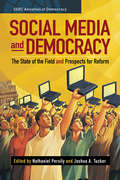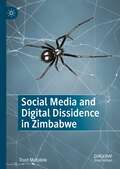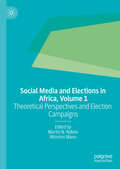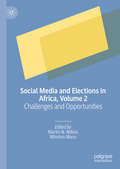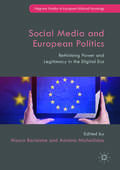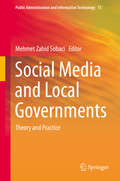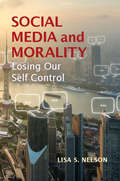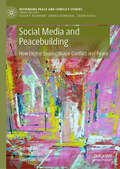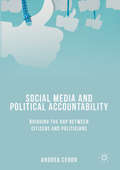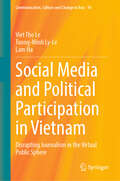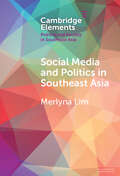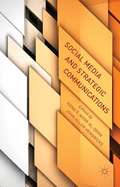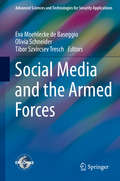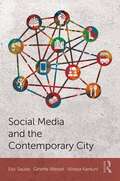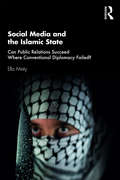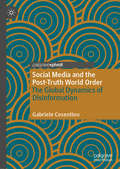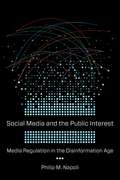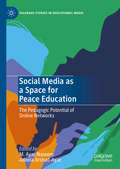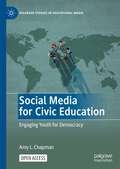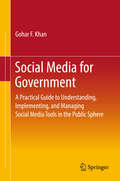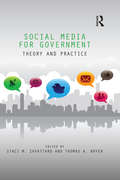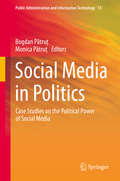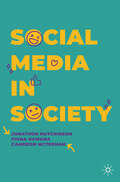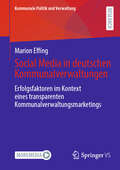- Table View
- List View
Social Media and Democracy: The State of the Field, Prospects for Reform (SSRC Anxieties of Democracy)
by Nathaniel Persily Joshua A. TuckerOver the last five years, widespread concern about the effects of social media on democracy has led to an explosion in research from different disciplines and corners of academia. This book is the first of its kind to take stock of this emerging multi-disciplinary field by synthesizing what we know, identifying what we do not know and obstacles to future research, and charting a course for the future inquiry. Chapters by leading scholars cover major topics – from disinformation to hate speech to political advertising – and situate recent developments in the context of key policy questions. In addition, the book canvasses existing reform proposals in order to address widely perceived threats that social media poses to democracy. This title is also available as Open Access on Cambridge Core.
Social Media and Digital Dissidence in Zimbabwe
by Trust MatsileleThis book proposes a new theorisation when studying cyber dissidents in an African digital sphere. It argues that social media dissidents are a recent development in a long lineage of dissidents in African societies. Using Zimbabwe as a case study, the study locates contemporary dissidents in the same family with other historical dissident figures found in African orature, the Chimurenga wars, through music, poetry and other forms of expression. The book argues against techno-deterministic approaches to studying social media-born digital dissidence in Africa. It is aimed at scholars dedicated to studying social media movements in African contexts and the global south generally, prompting them to re-evaluate their earlier conclusions and adopt a more nuanced and contextspecific approach.
Social Media and Elections in Africa, Volume 1: Theoretical Perspectives and Election Campaigns
by Winston Mano Martin N. NdlelaThis book brings together fresh evidence and new theoretical frameworks in a unique analysis of the increasing role of social media in political campaigns and electoral processes across Africa. Supported by contemporary and historical cases studies, it engages with the main drives behind the various appropriations of social media for election campaigns, organization, and voter mobilization. Contributors in this volume delve into changing and complex aspects of social media, offering an appraisal of theoretical perspectives and examining fascinating case studies which social media use is redefining elections across Africa. Contributions show that new media ecologies are resulting in new policy regimes, user behaviors, and communication models that have implications for electoral processes. The book also provides preliminary analysis of emerging forms of algorithm-driven campaigns, fake news, information distortions and other methods that undermine electoral democracy in Africa.
Social Media and Elections in Africa, Volume 2: Challenges and Opportunities
by Winston Mano Martin N. NdlelaThis book, the second of two volumes, explores the challenges and opportunities presented by the increased presence of social media within African politics. Electoral processes in Africa have assumed new dimensions due to the influence of social media. As social media permeates different aspects of elections, it is ostensibly creating new challenges and opportunities. Most evident are the challenges of hate speech, misogyny and incivility. This book considers the impact of digital media before, during, and after elections, as well as authorities' attempts to legislate and regulate the internet in response. Contributions to this volume analyse social media posts, transgressive images, newspaper articles, and include case studies of Algeria, Zimbabwe, Kenya, South Africa, Nigeria and Uganda. This results in the delivery of an original depiction of the use of social media in a variety of African contexts. This book will appeal to academics and students of media and communication studies, political studies, journalism, sociology, and African studies.
Social Media and European Politics
by Mauro Barisione Asimina MichailidouThis volume investigates the role of social media in European politics in changing the focus, frames and actors of public discourse around the EU decision-making process. Throughout the collection, the contributors test the hypothesis that the internet and social media are promoting a structural transformation of European public spheres which goes well beyond previously known processes of mediatisation of EU politics. This transformation addresses more fundamental challenges in terms of changing power relations, through processes of active citizen empowerment and exertion of digitally networked counter-power by civil society, news media, and political actors, as well as rising contestation of representative legitimacy of the EU institutions. Social Media and European Politics offers a comprehensive approach to the analysis of political agency and social media in European Union politics, by bringing together scholarly works from the fields of public sphere theory, digital media, political networks, journalism studies, euroscepticism, political activism and social movements, political parties and election campaigning, public opinion and audience studies.
Social Media and International Relations (Elements in International Relations)
by Sarah KrepsThe 2016 US election highlighted the potential for foreign governments to employ social media for strategic advantages, but the particular mechanisms through which social media affect international politics are underdeveloped. This Element shows that the populace often seeks to navigate complex issues of foreign policy through social media, which can amplify information and tilt the balance of support on these issues. In this context, the open media environment of a democracy is particularly susceptible to foreign influence whereas the comparatively closed media environment of a non-democracy provides efficient ways for these governments to promote regime survival.
Social Media and Local Governments
by Mehmet Zahid SobaciToday, social media have attracted the attention of political actors and administrative institutions to inform citizens as a prerequisite of open and transparent administration, deliver public services, contact stakeholders, revitalize democracy, encourage the cross-agency cooperation, and contribute to knowledge management. In this context, the social media tools can contribute to the emergence of citizen-oriented, open, transparent and participatory public administration. Taking advantage of the opportunities offered by social media is not limited to central government. Local governments deploy internet-based innovative technologies that complement traditional methods in implementing different functions. This book focuses on the relationship between the local governments and social media, deals with the change that social media have caused in the organization, understanding of service provision, performance of local governments and in the relationships between local governments and their partners, and aims to advance our theoretical and empirical understanding of the growing use of social media by local governments. This book will be of interest to researchers and students in e-government, public administration, political science, communication, information science, and social media. Government officials and public managers will also find practical use recommendations for social media in several aspects of local governance
Social Media and Morality: Losing Our Self Control
by Lisa S. NelsonIs social media changing who we are? We assume social media is only a tool for our modern day communications and interactions, but is it quietly changing our identities and how we see the world and one another? Our current debate about the human behaviors behind social media misses the important effects these social networking technologies are having on our sense of shared morality and rationality. There has been much concern about the loss of privacy and anonymity in the Information Age, but little attention has been paid to the consequences and effects of social media and the behavior they engender on the Internet. In order to understand how social media influences our morality, Lisa S. Nelson suggests a new methodological approach to social media and its effect on society. Instead of beginning with the assumption that we control our use of social media, this book considers how the phenomenological effects of social media influences our actions, decisions, and, ultimately, who we are and who we become. This important study will inform a new direction in policy and legal regulation for these increasingly important technologies.
Social Media and Peacebuilding: How Digital Spaces Shape Conflict and Peace (Rethinking Peace and Conflict Studies)
by Stephan Stetter Anna ReussThis book makes a novel contribution to the literature by examining the intersection of social media, conflict and peacebuilding. It challenges traditional state-centric and Eurocentric approaches to international relations and peace and conflict studies by examining the role of social media in peacebuilding beyond a simplistic tech-solutionist versus tech-skeptical duality. The book explains why the impact of social media on peacebuilding is complex and depends on the political context and strategies of the actors involved in it. It uses an interdisciplinary lens to explore the potential and limitations of social media in peacebuilding, thereby contributing to a theoretical and empirical understanding of the role of digital technology in shaping conflict and promoting peace. Chapter &“Fighting Hate Speech on Social Media: The Challenge of &“Deep Work&” in Digital Peacebuilding&” is available open access under a Creative Commons Attribution BY 4.0 International license via link.springer.com.
Social Media and Political Accountability
by Andrea CeronThis book illustrates how social media platforms enable us to understand everyday politics and evaluates the extent to which they can foster accountability, transparency and responsiveness. The first part focuses on accountability and tests whether the offline behavior of politicians is consistent with their online declarations, showing that textual analysis of politicians' messages is useful to explain phenomena such as endorsements, party splits and appointments to cabinet. The second part concerns responsiveness. By means of sentiment analysis, it investigates the shape of the interaction between citizens and politicians determining whether politicians' behavior is influenced by the pressure exerted on social media both on policy and non-policy issues. Finally, the book evaluates whether a responsive behavior is successful in restoring online political trust, narrowing the gap between voters and political elites. The book will be of use to students, scholars and practitioners interested in party organization, intra-party politics, legislative politics, social media analysis and political communication, as well as politicians themselves.
Social Media and Political Participation in Vietnam: Disrupting Journalism in the Virtual Public Sphere (Communication, Culture and Change in Asia #10)
by Viet Tho Le Tuong-Minh Ly-Le Lam HaThis book explores the nexus between social media use among young people and political participation in Vietnam, which presents a novel case example for examining whether social media can expand the public sphere to become involved in everyday politics. With an estimated 72 million Vietnamese on Facebook, the country is the seventh-largest user base in the world. This social media platform alone has created a virtual public sphere outside of and beyond the scope of the ruling Communist Party and its state-owned media outlets. The authors analyse the paradox of a complicated balancing act of digital participation in an authoritarian state, promoting a new understanding of social media in non-Western societies. The book generates a considerable body of empirical findings relating to political engagement amongst the youth in the digital age, and develops the theory of the public sphere beyond Habermas within this context. In its examination of the role of social media in society and in political communication generally, and the role of social media in authoritarian states, specifically, this book is of interest to students and scholars researching social media, political communication, and media theories. It is also relevant to those studying the intersection of media and politics in Southeast Asia, and in authoritarian states globally.
Social Media and Politics in Southeast Asia (Elements in Politics and Society in Southeast Asia)
by Merlyna LimThis Element endeavors to enrich and broaden Southeast Asian research by exploring the intricate interplay between social media and politics. Employing an interdisciplinary approach and grounded in extensive longitudinal research, the study uncovers nuanced political implications, highlighting the platform's dual role in both fostering grassroots activism and enabling autocratic practices of algorithmic politics, notably in electoral politics. It underscores social media's alignment with communicative capitalism, where algorithmic marketing culture overshadows public discourse, and perpetuates affective binary mobilization that benefits both progressive and regressive grassroots activism. It can facilitate oppositional forces but is susceptible to authoritarian capture. The rise of algorithmic politics also exacerbates polarization through algorithmic enclaves and escalates disinformation, furthering autocraticizing trends. Beyond Southeast Asia, the Element provides analytical and conceptual frameworks to comprehend the mutual algorithmic/political dynamics amidst the contestation between progressive forces and the autocratic shaping of technological platforms.
Social Media and Strategic Communications
by John Allen Hendricks Hana S. Noor Al-DeenSocial Media and Strategic Communications provides truly comprehensive and original scholarly research that exhibits the strategic implementation of social media in both advertising and public relations.
Social Media and the Armed Forces (Advanced Sciences and Technologies for Security Applications)
by Eva Moehlecke de Baseggio Olivia Schneider Tibor Szvircsev TreschSocial media has fundamentally changed communication and interaction in today's society. Apart from being used by individuals, it is also omnipresent in public sector organisations such as the armed forces. This book examines the opportunities and risks associated with social media in the context of the armed forces from an international, social scientific perspective. It discuses the impact of social media in the everyday life of military personnel and analyses the extent to which social media influences their performance, be it as a distraction or as a source of perceived appreciation. It particularly highlights the representation of masculinity and femininity in military social media channels, since the way gender is portrayed on social media has an effect on how future recruits and – at the other end of the military career spectrum – veterans feel they are approached. The book also focuses on the new form of follow-up discussion, which enables the armed forces to interact with the population. On social media, the armed forces are publicly presented, and this shapes the public’s opinions on them. Further, the armed forces can use debates as a monitoring tool of society's attitudes towards them or towards events that have an effect on society. Conversely, social media can lend a voice to military personnel, allowing them to be publicly heard. As discussions on social media can only be controlled to a limited extent, the context in which the armed forces are discussed alters their sphere of influence and potentially leads to a loss of control. An extreme example of this is the use of social media as a tool to strategically distribute misinformation in order to shape public opinion and threaten national security. Moreover, the use of social media to demoralise adversaries or to harm their credibility results in social media being considered a cyber weapon that affects politics and military activities.
Social Media and the Contemporary City
by Eric Sauda Ginette Wessel Alireza KarduniThe widespread adoption of smartphones has led to an explosion of mobile social media data, more than a billion messages per day that continuously track location, content, and time. Social Media in the Contemporary City focuses on the effects of social media on local communities and urban space in a variety of political and economic settings related to social activism, informal economic activity, public art, and global extremism. The book covers events ranging from Banksy art installations, mobile food trucks, and underground restaurants, to a Black Lives Matter protest, the Christchurch mosque shootings, and the Pulse nightclub shooting. The interplay between urban space, local community, and social media in each case study requires diverse methodologies that are both computational (i.e. machine learning, social network analysis, and natural language processing) and ethnographic (i.e. semi-structured interviews, thematic analysis, and site analysis). The book views social media not as a replacement for the local community or urban space but rather as a translation of the uses and meanings of all three realms. The book will be of interest to students, researchers, and instructors in a number of disciplines including urban design/planning, media studies, geography, and communications.
Social Media and the Islamic State: Can Public Relations Succeed Where Conventional Diplomacy Failed?
by Ella MintyThis book examines how social media has transformed extremist discourse. Drawing on ISIS and their sophisticated use of social media platforms and PR concepts, it explores the ways in which the outfit was able to recruit, mobilise and spread fundamentalist propaganda in regions where it had little physical presence. One of the first studies to draw a link between international diplomacy, the rise of fundamentalism and public relations, this book will be of great interest to scholars and researchers of defence and strategic studies, especially those working on ISIS propaganda, Middle East Studies, media studies, digital humanities, communication studies, public relations and international relations, as well general readers.
Social Media and the Post-Truth World Order: The Global Dynamics of Disinformation
by Gabriele CosentinoThis book discusses post-truth not merely as a Western issue, but as a problematic political and cultural condition with global ramifications. By locating the roots of the phenomenon in the trust crisis suffered by liberal democracy and its institutions, the book argues that post-truth serves as a space for ideological conflicts and geopolitical power struggles that are reshaping the world order. The era of post-truth politics is thus here to stay, and its reach is increasingly global: Russian trolls organizing events on social media attended by thousands of unaware American citizens; Turkish pro-government activists amplifying on Twitter conspiracy theories concocted via Internet imageboards by online subcultures in the United States; American and European social media users spreading fictional political narratives in support of the Syrian regime; and Facebook offering a platform for a harassment campaign by Buddhist ultra-nationalists in Myanmar that led to the killing of thousands of Muslims. These are just some of the examples that demonstrate the dangerous effects of the Internet-driven global diffusion of disinformation and misinformation. Grounded on a theoretical framework yet written in an engaging and accessible way, this timely book is a valuable resource for students, researchers, policymakers and citizens concerned with the impact of social media on politics.
Social Media and the Public Interest: Media Regulation in the Disinformation Age
by Philip M. NapoliFacebook, a platform created by undergraduates in a Harvard dorm room, has transformed the ways millions of people consume news, understand the world, and participate in the political process. Despite taking on many of journalism’s traditional roles, Facebook and other platforms, such as Twitter and Google, have presented themselves as tech companies—and therefore not subject to the same regulations and ethical codes as conventional media organizations. Challenging such superficial distinctions, Philip M. Napoli offers a timely and persuasive case for understanding and governing social media as news media, with a fundamental obligation to serve the public interest.Social Media and the Public Interest explores how and why social media platforms became so central to news consumption and distribution as they met many of the challenges of finding information—and audiences—online. Napoli illustrates the implications of a system in which coders and engineers drive out journalists and editors as the gatekeepers who determine media content. He argues that a social media–driven news ecosystem represents a case of market failure in what he calls the algorithmic marketplace of ideas. To respond, we need to rethink fundamental elements of media governance based on a revitalized concept of the public interest. A compelling examination of the intersection of social media and journalism, Social Media and the Public Interest offers valuable insights for the democratic governance of today’s most influential shapers of news.
Social Media as a Space for Peace Education: The Pedagogic Potential of Online Networks (Palgrave Studies in Educational Media)
by M. Ayaz Naseem Adeela Arshad-AyazThis book explores the potential of social media as a space for teaching and bringing about sustainable peace. Using cutting-edge research, the editors and authors analyze the fundamental transformations taking place in the digital and interactive public sphere, most recently with the advent of the ‘post-truth’ age and the impact of this upon young people’s perceptions of ‘friend’ and ‘foe’. Peace initiatives at almost every level recognize the importance of education for sustainable peace: this volume examines the opportunities emerging from these societal transformations for both formal and informal education. This book will appeal to students and scholars of social media, peace education and the post-truth age.
Social Media for Civic Education: Engaging Youth for Democracy (Palgrave Studies in Educational Media)
by Amy L. ChapmanThis open access book provides the theoretical and pedagogical foundations for a promising new approach to civic education: using social media to teach civics. While many measures indicate that youth civic engagement has long been in decline, many of these measures fail to take into account all of the ways that youth can interact with civic life. One of these understudied ways is through social media, including platforms like Twitter, where young people have the opportunity to encounter the news, engage with people in power, and bring attention to the needs in their community. Throughout this volume, Chapman explores how and why teachers can use social media to teach civics, as well as how it might meet the needs of students in ways other approaches do not.
Social Media for Government
by Gohar F. KhanThis book provides practical know-how on understanding, implementing, and managing main stream social media tools (e. g. , blogs and micro-blogs, social network sites, and content communities) from a public sector perspective. Through social media, government organizations can inform citizens, promote their services, seek public views and feedback, and monitor satisfaction with the services they offer so as to improve their quality. Given the exponential growth of social media in contemporary society, it has become an essential tool for communication, content sharing, and collaboration. This growth and these tools also present an unparalleled opportunity to implement a transparent, open, and collaborative government. However, many government organization, particularly those in the developing world, are still somewhat reluctant to leverage social media, as it requires significant policy and governance changes, as well as specific know-how, skills and resources to plan, implement and manage social media tools. As a result, governments around the world ignore or mishandle the opportunities and threats presented by social media. To help policy makers and governments implement a social media driven government, this book provides guidance in developing an effective social media policy and strategy. It also addresses issues such as those related to security and privacy.
Social Media for Government: Theory and Practice
by Staci M. Zavattaro Thomas A. BryerSocial media is playing a growing role within public administration, and with it, there is an increasing need to understand the connection between social media research and what actually takes place in government agencies. Most of the existing books on the topic are scholarly in nature, often leaving out the vital theory-practice connection. This book joins theory with practice within the public sector, and explains how the effectiveness of social media can be maximized. The chapters are written by leading practitioners and span topics like how to manage employee use of social media sites, how emergency managers reach the public during a crisis situation, applying public record management methods to social media efforts, how to create a social media brand, how social media can help meet government objectives such as transparency while juggling privacy laws, and much more. For each topic, a collection of practitioner insights regarding the best practices and tools they have discovered are included. Social Media for Government responds to calls within the overall public administration discipline to enhance the theory-practice connection, giving practitioners space to tell academics what is happening in the field in order to encourage further meaningful research into social media use within government.
Social Media in Politics
by Bogdan Pătruţ Monica PătruţThis volume sets out to analyse the relation between social media and politics by investigating the power of the internet and more specifically social media, in the political and social discourse. The volume collects original research on the use of social media in political campaigns, electoral marketing, riots and social revolutions, presenting a range of case studies from across the world as well as theoretical and methodological contributions. Examples that explore the use of social media in electoral campaigns include, for instance, studies on the use of Face book in the 2012 US presidential campaign and in the 2011 Turkish general elections. The final section of the book debates the usage of Twitter and other Web 2. 0 tools in mobilizing people for riots and revolutions, presenting and analysing recent events in Istanbul and Egypt, among others.
Social Media in Society
by Jonathon Hutchinson Fiona Suwana Cameron McTernanThis book is about the role that social media plays in the lives of individuals, societies, economies and polities. It therefore takes in a wide view of the emergent and changing impacts of social media platforms, and social media practices. As a consequence, it examines social media use through various intellectual and scholarly traditions --psychology, sociology, cultural studies, economics, and (national and global) politics – but it is primarily situated in the field of media and communications studies. As such, it frames its analysis of social media impacts using media studies concepts and terminology, and places media texts, forms, industries and agents (producers, audiences and other users) at the centre of each thematic chapter.
Social Media in deutschen Kommunalverwaltungen: Erfolgsfaktoren im Kontext eines transparenten Kommunalverwaltungsmarketings (Kommunale Politik und Verwaltung)
by Marion EffingDeutsche Kommunalverwaltungen stehen vor der Herausforderung, Social Media strategisch und zielgerichtet im Rahmen eines spezifischen Kommunalverwaltungsmarketings einzusetzen – unter Berücksichtigung begrenzter Ressourcen und besonderer Rahmenbedingungen. Die Studie zeigt, dass Social Media Potenziale bietet, deren Wirksamkeit jedoch stark von kommunalen Gegebenheiten abhängt und daher als Teil einer übergeordneten Kommunikationsstrategie betrachtet werden sollte.
